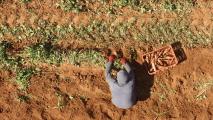
The Digital Frontier
Advancements in 20th century medicine reshaped society and made good health an expectation, not an exception. Now, 21st century breakthroughs may end disease, reverse aging, and restore sight and hearing — perhaps sooner than we think.
More
T-Minus Weekly: An astronaut’s return, a Martian dust devil, and more
Freethink’s weekly countdown of the biggest developments in space, featuring the return of NASA’s Frank Rubio, a dust devil on Mars, and more.
“Forbidden planet” is orbiting a star that should have destroyed it
About 520 light-years from Earth, the planet Halla is orbiting a red giant that should have already engulfed and destroyed it.
Jellyfish surprise scientists by learning without a brain
Researchers demonstrate that Caribbean box jellyfish don’t just float around aimlessly. They learn and adapt to their environment.
GPT-4 scores in the top 1% of test-takers for creative thinking
New AI tools are increasingly part of creative production, and are scoring surprisingly high in creative thinking tests.
Webb telescope spots strange objects in the Orion Nebula
New James Webb Space Telescope images of the Orion Nebula include more than 100 strange objects that are neither planets nor stars.
Is iron the Achilles’ heel for cancer?
Some cancer cells store high quantities of iron. Iron-activated cancer drugs selectively disrupt cancer cells, without harming healthy cells.
How technology is making it easier than ever for artists to become “solopreneurs”
Social media provides a platform for artists to promote their work, a way to communicate with their audience, and ultimately build better businesses.
Okay, so you’re an artist. How do you make $?
With the boom of social media, artists don’t need galleries to survive anymore. Here’s how not to become “the starving artist.”
Adding spider DNA to silkworms creates silk stronger than Kevlar
Spider silk is strong and tough, but hard to farm. Silkworm silk is easy to farm, but not that strong. What if we could combine the two?
Octopus tentacle-like patch delivers drugs through your cheek
A needle-free drug delivery system inspired by octopus tentacles could one day replace injections for administering biopharmaceuticals.
ChatGPT forces us to ask: how much of “being human” belongs to us?
Large language models have been trained on massive amounts of “natural” human language — just like us. Does this make the robots part human?
Rare mutation may counteract “Alzheimer’s gene”
A rare mutation suggests that using CRISPR to reduce the expression of the APOE-e4 gene could help treat or prevent Alzheimer’s.
Africa is 50% hotter than the rest of the world. How farmers are combating rising temperatures
Compared to the rest of the world, West Africa is getting hotter faster. Here’s the digital tool that helps farmers secure a higher yield.
New CRISPR tool has an “on/off” switch
By splitting a base editor into two parts, researchers could give it an “on/off” switch that appears to make it safer and more effective.
CRISPR is helping “de-extinct” the Tasmanian tiger
“De-extinction” researchers believe they might be able resurrect the Tasmanian tiger and restore ecological balance in Australia.
New “multipronged” gene therapy reverses paralysis in mice
A new gene therapy that guides nerve regeneration across complete spinal cord injuries restored the ability to walk in paralyzed mice.
Watch how video games are approaching perfect photorealism
Platforms like Unreal Engine 5 are enabling independent developers to create realistic digital worlds.
Artificial wombs for preemies move closer to human trials
A panel of FDA advisors has met to discuss the development of artificial wombs designed to help extremely premature babies survive.
What Arizona and other drought-ridden states can learn from Israel’s pioneering water strategy
Israel’s approach to desalination offers insights that Arizona would do well to consider for managing droughts.
Subscribe to the newsletter






















